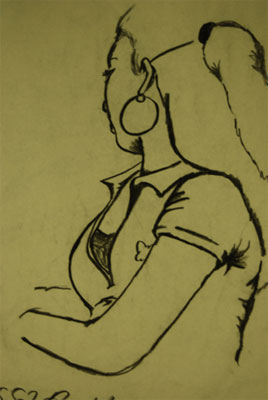All Nonfiction
- Bullying
- Books
- Academic
- Author Interviews
- Celebrity interviews
- College Articles
- College Essays
- Educator of the Year
- Heroes
- Interviews
- Memoir
- Personal Experience
- Sports
- Travel & Culture
All Opinions
- Bullying
- Current Events / Politics
- Discrimination
- Drugs / Alcohol / Smoking
- Entertainment / Celebrities
- Environment
- Love / Relationships
- Movies / Music / TV
- Pop Culture / Trends
- School / College
- Social Issues / Civics
- Spirituality / Religion
- Sports / Hobbies
All Hot Topics
- Bullying
- Community Service
- Environment
- Health
- Letters to the Editor
- Pride & Prejudice
- What Matters
- Back
Summer Guide
- Program Links
- Program Reviews
- Back
College Guide
- College Links
- College Reviews
- College Essays
- College Articles
- Back
Triathlete Chrissie Wellington MAG
Bulging quads. Scary tattoos. Disheveled hair on sweat-streaked faces. That's just the women.
Shaved legs. Tight shorts. Stylish sunglasses resting on sun-streaked hair. That's just the guys.
Waiting at Toga Bikes in New York for a celebrity event (the unveiling of the book A Life Without Limits: A World Champion's Journey), amidst a crowd of serious triathletes, helps one gain insight into the sport. From the buzz before the speaker arrived, it seemed a serious triathlete's life is one of regrets: angst at taking training time off to come to the event, too few miles logged that week, too much time spent with the kids.
And then the guest of honor, the otherworldly four-time undefeated world champion Ironman (which consists of a 2.4-mile swim, a 112-mile bike ride, and a 26.2-mile run) triathlete Chrissie Wellington bounded in. With a face-splitting smile, and hugs, high-fives, and thank-yous for all, Wellington reflected none of the gravity of the other athletes in the room. Her energy and enthusiasm made her almost levitate. What she “gets,” it seems, the other triathletes miss. She is past the days of being hypercritical of her weaknesses, and that has made all the difference.
Britain's Chrissie Wellington is an enigma. Perhaps that is why she is so beloved by her fans. Wellington, who is 35, began the sport fairly late – at 30. She noted that she “never grew up to be an athlete, never mind a professional athlete, never mind a world champion.” She did not take endless lessons, travel to far-off sports camps, or take part in select teams. She “worked out purely for fun,” swimming sometimes. But ingrained in her childhood and teen years were threads of traits that, while sometimes destructive, ultimately helped make her a world champion.
Wellington grew up with obsessive-compulsive disorder. While she credits it with helping her hone an endless drive for improvement, it was coupled with a poor self-image, causing Wellington to wander dangerously far down the path of anorexia and bulimia during her teen years.
Wellington stated, “We all have our fears – pain, not winning, not looking good. You can look at the fear and hide or you can address it head on.” Wellington addressed her illness, and she “made a millennial resolution to be less critical of her weaknesses” and to understand that most of what she berates herself for “isn't a weakness at all.” After turning her traits into positives, she eventually earned a master's degree with honors.
She used that experience and another huge resolution (to make people happy versus her old rut of trying to please people) as the impetus to get a job with the British government in a global development role. She worked in out-of-the-way locations in Africa and Asia, and when she witnessed abject poverty there – most evident on long treks, climbs, and hikes in these regions – she vowed to do all she could to help.
A framework was in place as she began to train for the 2002 London Marathon to support a charity. Her success there clinched her focus on sports. In Nepal for work, she began making long bike tours through the mountains, even hauling to Mount Everest's Base Camp. Realizing her sharp drive and capacity for endurance, Wellington inauspiciously slid into racing as her training increased to three sports.
The rest is history. She greatly respects her competitors, but she takes no garbage either. Tough as she is, she faithfully returns to a Kansas triathlon annually and never fails to cross the “yellow brick road” finish line, skipping hand-in-hand with a small child dressed as the (not so) Cowardly Lion. Her trademark smile even bares teeth. She notes, “It hides my discomfort, it helps me cope, and it shows my joy. But it also sends a message to my competitors.”
She is demure about her place in the sport, but she uses her fame to create awareness and raise funds for a number of charities. Amazingly, Wellington spends hours after each world championship at the finish line, congratulating, encouraging, and handing out finisher medals to the “back of the packers” – those who struggle to finish in the dark of night.
On top, but looking down the ranks, Wellington reflected, “I love seeing women and girls increasingly filling up triathlons. I love seeing the sport reach a broader participation, especially teens.” She added, “I know firsthand, and from my days as a swim instructor, how powerful sports can be for kids, how it can help them overcome fears.”

Similar Articles
JOIN THE DISCUSSION
This article has 0 comments.
